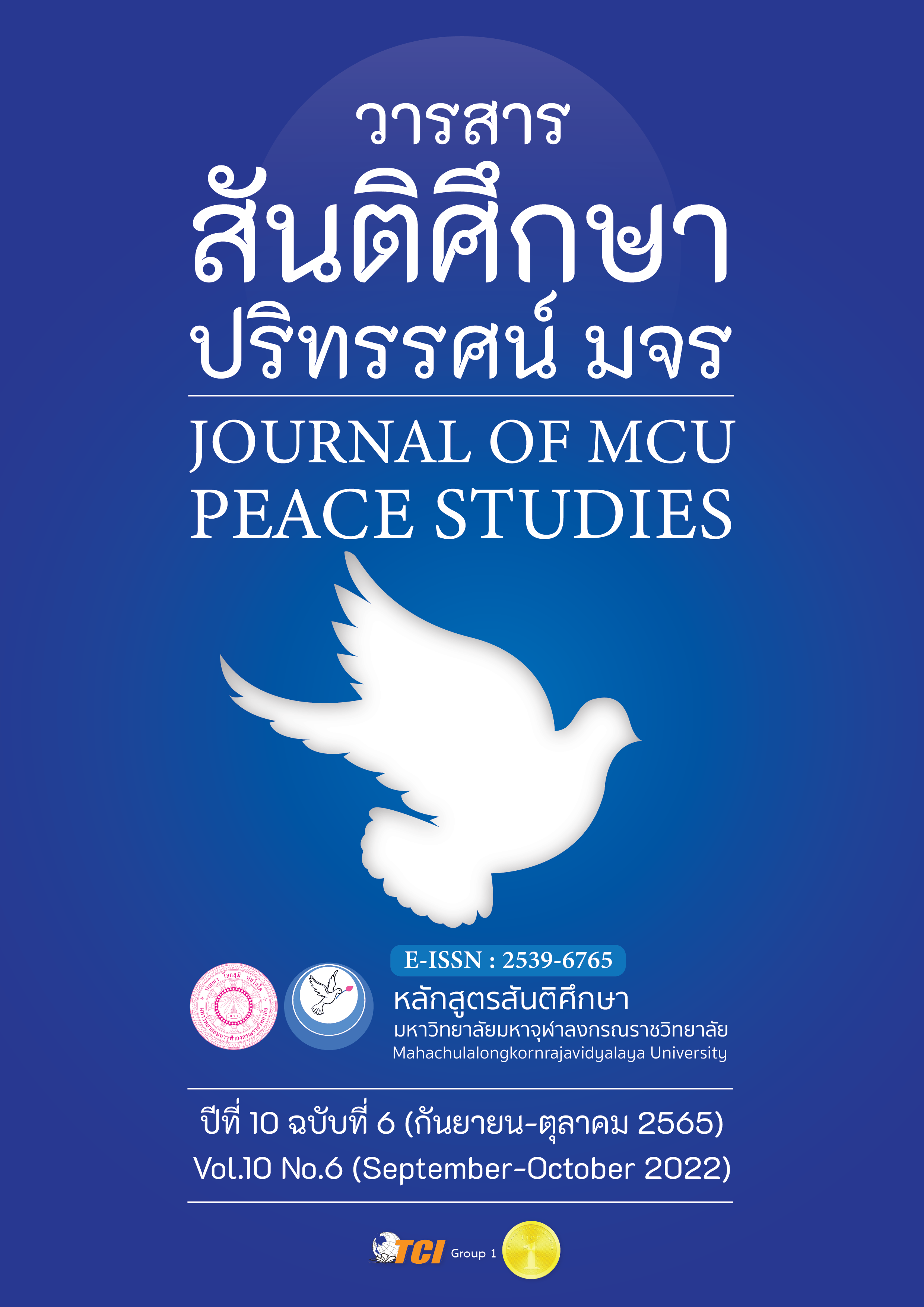การวิจัยและพัฒนาการจัดการเรียนรู้เชิงนวัตกรรม เพื่อยกระดับคุณภาพการผลิตและพัฒนาครูสู่โลกอนาคต
Main Article Content
บทคัดย่อ
บทความวิจัยนี้มีความมุ่งหมายการวิจัย 1) เพื่อสร้างและหาคุณภาพรูปแบบการจัดการเรียนรู้ส่งเสริมทักษะการจัดการเรียนรู้เชิงนวัตกรรม 2) เพื่อศึกษาทักษะการจัดการเรียนรู้เชิงนวัตกรรมหลังการใช้รูปแบบ โดยใช้แนวคิดการพัฒนารูปแบบการจัดการเรียนรู้ของ Joyce, Weil และ Calhoun โดยดำเนินการวิจัยและพัฒนา กลุ่มเป้าหมาย คือนักศึกษาครูปฐมวัย นักศึกษาครูประถมศึกษา และ นักศึกษาครูมัธยมศึกษา จำนวน 150 คน ซึ่งได้มาโดยการเลือกแบบเจาะจง สถิติทดสอบ คือ ANOVA
ผลการวิจัยพบว่า รูปแบบการจัดการเรียนรู้ส่งเสริมทักษะการจัดการเรียนรู้เชิงนวัตกรรมที่พัฒนาขึ้น มี 6 องค์ประกอบ ได้แก่ 1) แนวคิดพื้นฐานและหลักการสำคัญ 2) เป้าหมาย 3) ขั้นตอนการเรียนการรู้ 4) ระบบสังคม 5) การตอบสนอง และ 6) ระบบสนับสนุน จากการสังเคราะห์ขั้นตอนการจัดการเรียนรู้เป็น 4 ขั้น คือ 1) ขั้นกำหนดเป้าหมาย 2) ขั้นประยุกต์ใช้เทคโนโลยี 3) ขั้นสร้างนวัตกรรม และ 4) ขั้นจัดการเรียนรู้ ผลจากการใช้รูปแบบการจัดการเรียนรู้ส่งเสริมทักษะการจัดการเรียนรู้เชิงนวัตกรรมพบว่า รูปแบบการจัดการเรียนรู้ส่งเสริมทักษะการจัดการเรียนรู้เชิงนวัตกรรมพบว่า นักศึกษาครูมีพัฒนาการของทักษะการจัดการเรียนรู้เชิงนวัตกรรมสูงขึ้นอย่างมีนัยสำคัญทางสถิติที่ระดับ .05
Article Details

อนุญาตภายใต้เงื่อนไข Creative Commons Attribution-NonCommercial-NoDerivatives 4.0 International License.
ทัศนะและความคิดเห็นที่ปรากฏในบทความในวารสาร ถือเป็นความรับผิดชอบของผู้เขียนบทความนั้น และไม่ถือเป็นทัศนะและความรับผิดชอบของกองบรรณาธิการ ยินยอมว่าบทความเป็นลิขสิทธิ์ของวารสาร
เอกสารอ้างอิง
Anderson, L.W. A. (2001). Taxonomy for Learning Teaching, and Assessing: A Revision of Bloom's Taxonomy of Education Objectivcs. New York: Addison Wesley Longman.
At the Meeting of the President of Rajabhat Universities Nationwide. (2017). The New Strategy of Rajabhat University to Develop Local According to The Royal Patronage. Bangkok: Ministry of Education.
Barkley, E. F., Cross, K. P., & Major, C. H. (2014). Collaborative Learning Techniques: A Handbook for College Faculty. New York: John Wiley & Sons.
Bellanca, J. A. (2010). 21st Century Skills: Rethinking How Students Learn. United States: Solution Tree Press.
Bender, W. N. (2012). Project-Based Learning: Differentiating Instruction for the 21st Century. United States: Corwin.
Boud, D., & Feletti, G. (2013). The Challenge of Problem-Based Learning. New York: Routledge.
Chareonwongsak, K. (2013). Creative Thinking. Bangkok: Success Media.
Division of Research Administration and Educational Quality Assurance. (2017). Thailand 4.0 Model Drive of Thailand Towards Stability, Wealth and Sustainable. Bangkok: Division of Research Administration and Educational Quality Assurance.
Edwards, A. (2012). New Technology and Education. London: A&C Black.
Garrison, D. R. (2015). Thinking Collaboratively: Learning in a Community of Inquiry. New York: Routledge.
Innovation and Business Skills Australia (IBSA) Australia. Department of Education, Employment and Workplace Relations (DEEWR). (2009). Developing Innovation Skills: A Guide for Trainers and Assessors to Foster the Innovation Skills of Learners Through Professional Practice.
Jain, L. C. (2013). Innovative Teaching and Learning: Knowledge-Based Paradigms. Physica.
Joyce, B., M. Weil & E. Calhoun. (2014). Models of Teaching. (9th ed.). Boston: Pearson Education.
Khammanee, T. (2010). Pedagogy: Knowledge for Organizing Effective Learning Process. Bangkok: Publisher of Chulalongkorn University.
Knirk, F.G., B., & K. L. Gustafson. (1986). Instructional Technology: A Systematic Approach to Education. Florida: Holt, Rinehart and Winston.
Ministry of Education. (2019). Ministry of Education Announcement on Undergraduate Qualifications Standards Department of Education (Four Years Course) 2019.
Morad, S., Ragonis, N., & Barak, M. (2014). Innovative Thinking and ICT Expertise of Undergraduate Students in Education. Learning in the Technological Era: Proceedings of the 9th Chais Conference for the Study of Innovation and Learning Technologies, 112-120.
Mugione, F., & Penaluna, A. (2018). Developing and Evaluating Enhanced Innovative Thinking Skills in Learners. In Entrepreneurial Learning City Regions (pp. 101-120). Springer, Cham.
Nussbaum-Beach, S., & Hall, L. R. (2012). The Connected Educator: Learning and Leading in a Digital Age. Unite States: Solution Tree Press.
Office of Higher Education Commission. (2017). Education in Thailand B.E. 2560-2579. Bangkok: Prigwan Graphic Co., Ltd.
Phusee-orn, S. (2018). Educational Research and Development. Mahasarakham: Taksila Printing.
Shekar, A. (2013). Teaching Innovative Thinking and Consumer-Oriented Design to Engineering Students: Perspectives Based on Observations and Experience. International Journal of Mechanical Engineering Education, 41(1), 14-16.
Srisa-ard, B. (2010). Preliminary Research. ( 8th ed.). Bangkok: Suwiriyasan Printing.
Sutthirat, C. (2010). 80 Innovative Learning Management That Focuses on the Learners. (3rd ed.). Bangkok: Danex Intercorporation.
Varnhagen, et al. (2010). Teaching, Research, and Discovery Learning: Recommendations for a Great University. Teaching, Research, and Discovery Learning, 1-16.
Wisetsat, C. (2022). Research and Development of Innovation Skills for Thai Youth to Support Their Careers in the Future. Journal of MCU Peace Studies, 10(2), 497-508.
Wisetsat C., & Nuangchalerm, P. (2019). Synthesis of Innovative Thinking Skills of Pre-Service Teachers. Journal of Education Rajabhat Maha Sarakham University, 6(1), 451-464.
Wisetsat, C., et al. (2019). The Results of Data Analysis on the Need of Enhancement Pre-Service Teachers’ Innovative Teaching. Buabandit Journal of Educational Administration, 19(4), 357-371.
Zhu, C., Wang, D., Cai, Y., & Engels, N. (2013). What Core Competencies Are Related to Teachers' Innovative Teaching?. Asia-Pacific Journal of Teacher Education, 41(1), 9-27.


